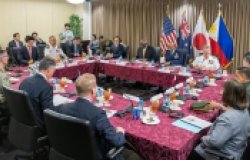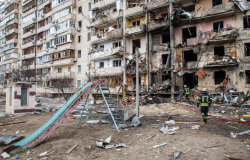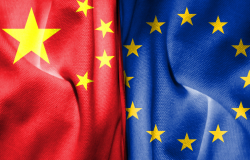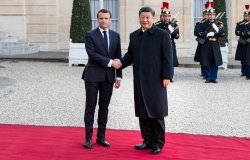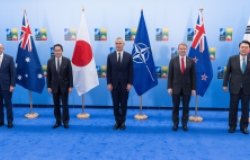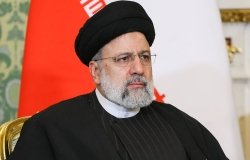Macron’s Vision for Transforming a ‘Mortal’ Europe
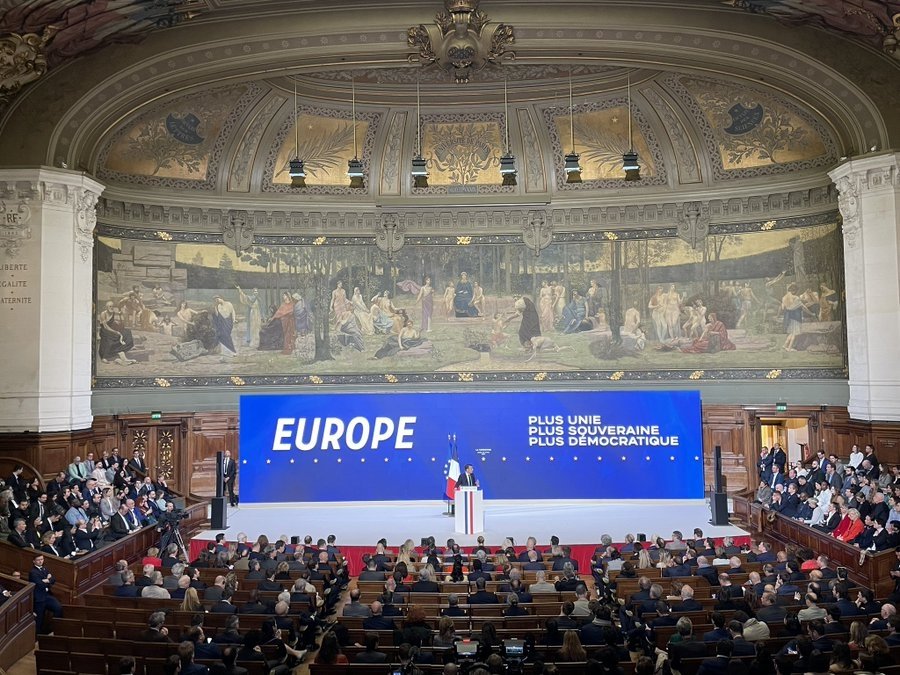
Twitter/Georgina Wright
Macron is a polarizing figure in Europe. For some he represents leadership and vision, for others he embodies hypocrisy and inaction. One thing is clear from his latest speech, delivered April 25, 2024 at the Sorbonne University: the French President has grand ideas for the future of Europe and is not afraid to point out some of the challenges facing the continent. He warns: “Europe is mortal. It can die”, underscoring his call to action for a stronger and more capable Europe. Macron puts forward an honest assessment of Europe’s future security and its role in tackling global challenges, placing France as the driving force for making Europe more independent and stronger in the current geostrategic environment.
In 2017, Macron delivered a similarly grandiose speech at the Sorbonne in what has now been hailed as a landmark speech articulating calls for European security and strategic autonomy. The context though was very different: he was freshly voted into office; he had a burgeoning relationship with German Chancellor Angela Merkel; and he drew upon both US isolationism and an adrift NATO to push for strategic autonomy. PESCO was in its nascency, and the notion of strengthening the security role of the EU seemed like a distant fantasy.
Now, in 2024, Macron faces a completely different reality. In part, this is a reality he envisioned back in 2017: Europe is investing more in its defense capabilities, military budgets are reaching unprecedented levels, and Europe is taking on a more strategic role in the world. Europe awoke too slowly, as Macron said in his address, it took Russia’s illegal invasion of Ukraine to spur the changes he called for in 2017.
Security was the highlight of Macron’s speech. He makes it clear that Europe as it exists today will not survive unless urgent action is undertaken in the next 5-10 years on European defense. He proposes building a “European defense initiative” which will “perhaps” include a European anti-missile shield, and in which nuclear deterrence will have a crucial role, spearheaded by France. He also called for enhancing European cybersecurity and cyberdefense capacity. Furthermore, the President pleaded for a new more joint borrowing on the European level and more support from the European Investment Bank to finance common defense efforts. “Buy European” was a clear message he conveyed, as he bemoaned Europe’s dependence on non-European military suppliers. On the future of alliances, he argues that what initially began as ‘French’ strategic autonomy has transcended and become pan-European–although Poland and Baltic countries might not share this assessment. Interestingly, he cited the European pillar within NATO as a strength while clearly stating that Europe should be able to defend its territory along with its allies, but also by itself, when needed. On deepening European defense cooperation, Macron underlines the dire need to foster strategic proximity through the launch of the second phase of the European Intervention Initiative. He argues that this joint military project – that he suggested in his 2017 Sorbonne speech – has been effective in creating coalitions to build a common military culture, but should be further enhanced. This could be done through the establishment of European regional security and defense strategies, and with the creation of the first truly European military academy.
This links up to his plea about the need for the EU to extend its partnerships with third countries and to refuse the narrative of a bipolar confrontation between the US and China, mentioning the EU-Africa Summit and the EU’s Indo-Pacific Strategy. Europe is and should ‘never be the vassal of the US’, Macron argued. Moreover, Macron mentions the European Political Community (EPC), one of his flagship initiatives launched in 2022, as the appropriate instance to build this new security paradigm. On that point, he mentions the strategic need to rethink the EU’s neighborhood, starting with Ukraine and Moldova, and the need to secure an EU future for the Western Balkans. Interestingly, he also underlines the potential for a partnership with the United Kingdom, due to host the next summit of the EPC in July. Macron envies himself as a disruptor: he is willing to explore and propose new frameworks for cooperation, or at the very least he does not accept the current order and is willing to openly question it.
On the economic front, Macron underlines the need to build a prosperity pact so that the EU can become a leader in the five following strategic sectors by 2030: AI, quantum computing, space, biotechnologies, and new energies, such as hydrogen and nuclear power. Overall, he argues that the EU single market should be extended and strengthened in sectors that have thus far been ignored such as energy, telecoms, or financial services. Macron’s general rationale is that this objective could be achieved with a “new growth model” that focuses on reindustrialization, that stops over-regulating, and opposes decarbonization from hindering economic growth. To this end, in addition to calling for a European preference in strategic sectors – derogating to EU competition policy to support key sectors in transition such as green technologies and AI – Macron calls for investing much more in research and innovation. Investing in breakthrough innovations would enable the EU to face the ever-increasing competition from both the US and China. Moreover, focusing on the energy sector – building an “atomic Europe” – and on agriculture, with a strong Common Agricultural Policy, is vital. That would go hand-in-hand with a revision of the EU’s trade policy, that must remain open while defending EU interests.
In his speech, President Macron manages to convey his French agenda for Europe. However, some EU member states may voice concerns about this France-centered vision of Europe. With a strong sense of urgency, he argues that the EU may die if it does not adapt or reform. Indeed, while vouching for a “Europe of power and prosperity”, Macron also warned of the “immense risk” of the old continent being “weakened, or even relegated” in the current international context, marked by Russia’s war against Ukraine, and US-China competition. Ramping up the EU’s defense industry and strengthening EU cooperation in this sector should be the way ahead.
About the Authors

Global Europe Program
The Global Europe Program is focused on Europe’s capabilities, and how it engages on critical global issues. We investigate European approaches to critical global issues. We examine Europe’s relations with Russia and Eurasia, China and the Indo-Pacific, the Middle East and Africa. Our initiatives include “Ukraine in Europe” – an examination of what it will take to make Ukraine’s European future a reality. But we also examine the role of NATO, the European Union and the OSCE, Europe’s energy security, transatlantic trade disputes, and challenges to democracy. The Global Europe Program’s staff, scholars-in-residence, and Global Fellows participate in seminars, policy study groups, and international conferences to provide analytical recommendations to policy makers and the media. Read more


